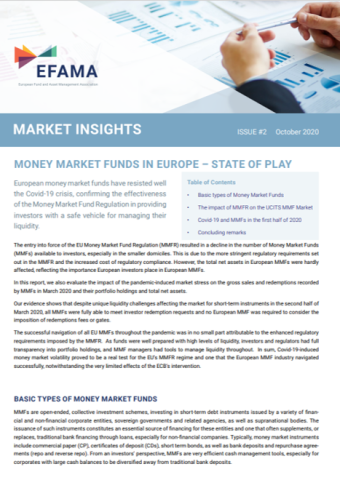The European Fund and Asset Management Association (EFAMA) has published its second Market Insights highlighting the major trends shaping the European Money Market Fund (MMF) landscape since the entry into force of the Money Market Fund Regulation (MMFR).
This new Market Insights shows that the stringent regulatory requirements imposed by the MMFR resulted in a 16% decline in the number of UCITS MMFs in the first quarter of 2019. This is especially evident in smaller domiciles as the increased costs of complying with the MMFR were deemed too high. However, the total net assets in European MMFs were hardly affected, reflecting the importance European investors continue to place in European MMFs.
The report also evaluates the impact of the pandemic-induced market stress on the gross sales and redemptions recorded by MMFs in the first half of 2020, as well as their portfolio holdings and total net assets. Despite the unique liquidity challenges that affected the market for short-term instruments in March 2020, no European MMF was found to be in breach of its regulatory liquidity requirements and all MMFs were fully able to meet investor redemption requests. Whereas MMFs suffered a significant increase in redemptions, they also recorded a sharp increase in gross sales, as certain investors moved into MMFs, viewing these as safe, diversified assets that would protect them from the disruptions and volatility in the capital markets.
Tanguy van de Werve, EFAMA Director General commented: "The Covid-19 crisis proved to be a real test for the EU Money Market Fund Regulation. The successful navigation of all EU MMFs throughout the pandemic-induced market stress demonstrates the effectiveness of the new EU regulatory regime in providing investors with a safe vehicle for managing liquidity."
-- ENDS --
For media enquiries, please contact:
Hume Brophy
Kerri Anne Rice kerrianne.rice@humebrophy.com
Paul Andrieu paul.andrieu@humebrophy.com
Or EFAMA at info@efama.org
Notes to editors:
Money Market Funds (MMFs) are open-ended, collective investment schemes, investing in short-term debt instruments issued by a variety of financial and non-financial corporate entities, sovereign governments and related agencies, as well as supranational bodies. The issuance of such instruments constitutes an essential source of financing for these entities and one that often supplements, or replaces, traditional bank financing through loans, especially for non-financial companies. Typically, money market instruments include commercial paper (CP), certificates of deposit (CDs), short term bonds, as well as bank deposits and repurchase agreements (repo and reverse repo). From an investor' perspective, MMFs are very efficient cash management tools, especially for corporates with large cash balances to be diversified away from traditional bank deposits.
About the European Fund and Asset Management Association (EFAMA):
EFAMA, the voice of the European investment management industry, represents 28 Member Associations, 60 Corporate Members and 24 Associate Members. At end Q2 2020, total net assets of European investment funds reached EUR 17.1 trillion. These assets were managed by almost 34,200 UCITS (Undertakings for Collective Investments in Transferable Securities) and more than 29,100 AIFs (Alternative Investment Funds). More information is available at www.efama.org.
Follow EFAMA on Twitter @EFAMANews or LinkedIn @EFAMA for latest updates.



























